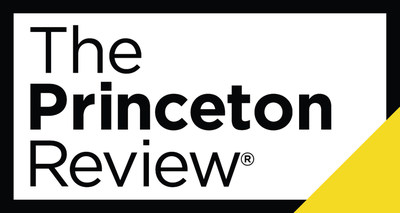The Princeton Review's "Paying for College" 2026 Edition is Out
Annually updated guide shares strategies for completing the 2026–2027 FAFSA and CSS Profile
to one's best advantage as well as planning for long- and short-term college costs
NEW YORK, Sept. 16, 2025 /PRNewswire/ -- The Princeton Review®, known for its education resources that help students gain admission to colleges, today released the 2026 edition of its annually updated guide to helping parents save, plan, and find funding to pay for college.
Paying for College: Everything You Need to Maximize Financial Aid and Afford College (Penguin Random House, September 16, 2025, $25.99) is authored by Kalman A. Chany with Geoff Martz. Chany, a nationally recognized expert on college funding, is the founder and president of Campus Consultants Inc., an independent New York-based college financial aid advisory firm.
Over its 34 years of publication, Paying for College has been praised by reviewers and finance professionals alike. Newsday Family Finance columnist Lynn Brenner recommended it as "a first-rate guide through the financial aid maze." Washington Post syndicated columnist Michelle Singletary chose it for her Color of Money book club. Forbes contributor John Wasik noted it "can save thousands in college bills."
Finding ways to save on college bills has become crucial for families in sticker shock. Among the nearly 10,000 college applicants and parents nationwide who completed The Princeton Review's College Hopes & Worries 2025 Survey in February, 98% said they would need financial aid to pay for college, and 82% of that cohort characterized their level of need as "very" or "extremely" necessary.
Concerns about affording college are understandable. In 2024–2025, the average cost of college at public four-year colleges (in-state) was $24,920. At private four-year colleges it was $58,600. On the upside: $190.1B was awarded to undergraduates in 2024 in financial aid (including grants, scholarships, federal loans, tax credits and other sources). About 76% of them received some form of financial aid.
"You might think that families who receive the most financial aid would be the families with the most need," Chany notes in the introduction of the book. "In fact, this is not necessarily true. The people who receive the most aid are the people who best understand the aid process."
Chany well understands the aid process. Since 1981, he has annually analyzed the formulas by which financial aid need is assessed and aid awards are determined. He advises his clients on planning long- and short term for college funding and ways to maximize their eligibility for financial aid. He provides guidance on submitting aid applications to their best advantage—much in the same way an accountant advises clients on tax planning and provides guidance on submitting IRS returns to their best advantage.
What distinguishes Paying for College as a one-of-a-kind resource is this: it is the only annually updated financial aid guide to provide detailed guidance on completing the two most important aid application forms for the forthcoming aid award year. Those forms are the U.S. Department of Education's FAFSA® (Free Application for Federal Student Aid), which all financial aid applicants must submit, and the College Board's CSS Profile®, an aid application that hundreds of selective colleges require. Both have dozens of questions requiring extensive information about family income, assets, and other factors. They are crucial in terms of their impact on aid award offers. Chany's guidance about these forms in Paying for College and his updates online for purchasers of the book (see below) is specifically keyed to the 2026–2027 versions.
Chany's advice in the new edition of the book is even more timely due to sweeping changes in the financial aid landscape resulting from the passage of two major federal bills. One is the budget reconciliation law known as the One, Big, Beautiful Bill Act (OBBBA) which passed in July. The other is the FAFSA Simplification Act which resulted in the troubled rollout in late 2023 of the Simplified FAFSA, which Chany notes was "little short of a disaster."
Paying for College also provides guidance on other subjects important to college applicants and their parents including:
- choosing colleges with financial aid in mind
- comparing aid award offers and appealing for more aid if necessary
- taking education loans, understanding payment plans, and managing loan debt
A chapter in the book titled "Special Topics" has aid application advice for parents who are single, separated, divorced or in blended families as well as advice for students who are independent, international, or older than the traditional applicant.
Purchasers of Paying for College can register at PrincetonReview.com/guidebooks to access forthcoming updates about financial aid. Among them are changes from the government that were pending as the book went to press. Chany's summary on what aid applicants need to know about the July passage of the OBBBA also includes information about financial aid changes that will go in to effect in 2026. Icons in the book's margins flag topics to check.
Paying for College is one of more than 150 books developed by The Princeton Review and published by Penguin Random House in a line that includes The Best 391 Colleges and guides to the SAT, ACT and AP® exams. The Princeton Review is also known for its annual college rankings in dozens of categories including its highly popular "Great Financial Aid" and Best Value Colleges lists.
About Kalman A. Chany
Kalman A. Chany is the founder and president of Campus Consultants Inc., an independent New York-based financial aid advisory firm that has helped thousands of families maximize their aid eligibility since 1984. He has been sourced on college funding topics in Money, The Wall Street Journal, and CNBC.com and has shared his timely advice for aid applicants on CBS Evening News, NBC Nightly News, NPR Talk of the Nation, and other media.
About The Princeton Review
The Princeton Review is a leading tutoring, test prep, and college admissions services company. Every year, it helps millions of college- and graduate school–bound students as well as working professionals achieve their education and career goals through its many education services and products. These include online and in-person courses delivered by a network of more than 4,000 teachers and tutors; online resources; a line of more than 150 print and digital books published by Penguin Random House; and dozens of categories of school rankings. Founded in 1981, the company is now in its 44th year. The company's Tutor.com brand, now in its 25th year, is one of the largest online tutoring services in the U.S. It comprises a community of thousands of tutors who have delivered more than 28 million tutoring sessions. The Princeton Review, headquartered in New York, NY, is not affiliated with Princeton University. For more information, visit PrincetonReview.com. Follow the company on Instagram (@theprincetonreview), LinkedIn (the-princeton-review), YouTube (@ThePrincetonReview), and TikTok (@princeton.review).
PAYING FOR COLLEGE: Everything You Need to Maximize Financial Aid and Afford College by Kalman A. Chany with Geoff Martz
Penguin Random House • 2026 Edition • ISBN 978-0593-51878-6 • September 16, 2025 • 384 pages
$25.99 (Canada$35.99)
ACT® is a registered trademark of ACT, Inc.
AP®, CSS Profile®, and SAT® are trademarks registered by the College Board, which is not affiliated with, and does not endorse, The Princeton Review.
FAFSA® is a registered trademark of the U.S. Department of Education.
![]() View original content to download multimedia:https://www.prnewswire.com/news-releases/the-princeton-reviews-paying-for-college-2026-edition-is-out-302557012.html
View original content to download multimedia:https://www.prnewswire.com/news-releases/the-princeton-reviews-paying-for-college-2026-edition-is-out-302557012.html
SOURCE The Princeton Review



